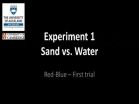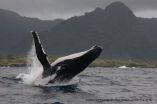(Press-News.org) Scientists monitored Cuvier's beaked whales' record-breaking dives to depths of nearly two miles below the ocean surface and some dives lasted for over two hours, according to results published March 26, 2014, in the open access journal PLOS ONE by Gregory Schorr from Cascadia Research Collective and colleagues.
Distributed throughout the world's oceans, the Cuvier's beaked whales' frequent dives deep into the ocean make them difficult for researchers to study. Previous studies using short-term tags (~ 215 hours of data) have indicated that this deep-diving species might be the most extreme breath-holding diver in the ocean. To better understand this behavior, scientists analyzed data from satellite-linked tags that recorded the diving behavior and locations of eight Cuvier's beaked whales off the Southern California coast. Researchers collected over 3,700 hours of diving data, including depth and time of each dive.
Researchers recorded 1100 deep-dives, averaging 0.87 miles deep, and 5600 shallow-dives, averaging about 0.17 miles deep. The deepest dives recorded was one that reached nearly two miles below the ocean surface, and the longest lasted 137 minutes. The dives captured by this study not only exceed the previous Cuvier's beaked whale diving records of ~1 mile deep and 95 minutes, but also the current mammalian dive record previously set by the southern elephant seal at ~1.5 miles deep and 120 minutes. One striking difference compared to other divers is that deep-diving elephant seals and sperm whales require an extended recovery period after long, deep dives, whereas Cuvier's beaked whales average less than two minutes at the surface between dives.
According to the authors, the results of this study provide a better understanding of the unique diving capabilities of this species, which accounts for 69% of recorded marine mammal strandings associated with military sonar operations. However, all eight whales were tagged on a Navy sonar training range off the west coast of California and spent significant portion of their time there, suggesting that these animals may have learned to cope with anthropogenic disturbances that cause stranding in Cuvier's beaked whales elsewhere. "It's remarkable to imagine these social, warm-blooded mammals actively pursuing prey in the darkness at such astounding depths, literally miles away from their most basic physiological need: air," added Greg Schorr
INFORMATION:
Citation: Schorr GS, Falcone EA, Moretti DJ, Andrews RD (2014) First Long-Term Behavioral Records from Cuvier's Beaked Whales (Ziphius cavirostris) Reveal Record-Breaking Dives. PLoS ONE 9(3): e92633. doi:10.1371/journal.pone.0092633
Financial Disclosure: Field work was funded by a grant to Cascadia Research Collective from the United States Navy (N45) via the Naval Postgraduate School (Grant Number N00244-10-1-0050) (http://www.nps.edu/). Development of the Mk10-A LIMPET tag was funded by Wildlife Computers and the Office of Naval Research (Grant Number N000140811203) with additional support from the Alaska SeaLife Center and National Oceanic and Atmospheric Administration/Northwest Fisheries Science Center. Marine Mammal Monitoring on Navy Ranges (M3R) is funded by the United States Navy (N45) via the Living Marine Resources program (http://www.lmr.navy.mil/). The funders had no role in study design, data collection and analysis, decision to publish, or preparation of the manuscript.
Competing Interest Statement: DJM is employed by the United States Navy, though in a different division than the funders of this work. No part of the analysis or write up was influenced by the funders or sponsors of the research. This does not alter the authors' adherence to PLOS ONE policies on sharing data and materials.
PLEASE LINK TO THE SCIENTIFIC ARTICLE IN ONLINE VERSIONS OF YOUR REPORT (URL goes live after the embargo ends):http://dx.plos.org/10.1371/journal.pone.0092633
Cuvier's beaked whales set new breath-hold diving records
Whales dive to nearly 2 miles depth, for over 2 hours
2014-03-26
ELSE PRESS RELEASES FROM THIS DATE:
Crows complete basic 'Aesop's fable' task
2014-03-26
VIDEO:
This video shows example trials for each of the six experiments.
Click here for more information.
New Caledonian crows may understand how to displace water to receive a reward, with the causal understanding level of a 5-7 year-old child, according to results published March 26, 2014, in the open access journal PLOS ONE by Sarah Jelbert from University of Auckland and colleagues.
Understanding causal relationships between actions is a key feature of human cognition. However, ...
Humpback whale populations share core skin bacterial community
2014-03-26
Humpback whales share a simplistic skin bacterial community across populations, according to results published March 26, 2014, in the open access journal PLOS ONE by Amy Apprill from the Woods Hole Oceanographic Institution and colleagues. The overall bacterial communities differ by geographic area and by metabolic state, such as feeding versus starving during migration and breeding.
Bacterial communities living on mammal skin may play a role in their health; for humans, there is a relationship between skin bacteria and allergic or inflammatory conditions. While skin ...
New drug successfully treats crizotinib-resistant, ALK-positive lung cancer
2014-03-26
Although the targeted cancer treatment drug crizotinib is very effective in causing rapid regression of a particular form of lung cancer, patients' tumors inevitably become resistant to the drug. Now a new drug called ceritinib appears to be effective against advanced ALK-positive non-small cell lung cancer (NSCLC), both in tumors that have become resistant to crizotinib and in those never treated with the older drug. The results of a phase 1 clinical trial conducted at centers in 11 countries are reported in the March 27 New England Journal of Medicine.
"Crizotinib ...
Patches of cortical layers disrupted during early brain development in autism
2014-03-26
Researchers at the University of California, San Diego School of Medicine and the Allen Institute for Brain Science have published a study that gives clear and direct new evidence that autism begins during pregnancy.
The study will be published in the March 27 online edition of the New England Journal of Medicine.
The researchers – Eric Courchesne, PhD, professor of neurosciences and director of the Autism Center of Excellence at UC San Diego, Ed S. Lein, PhD, of the Allen Institute for Brain Science in Seattle, and first author Rich Stoner, PhD, of the UC San Diego ...
Bamboo-loving giant pandas also have a sweet tooth
2014-03-26
PHILADELPHIA (March 26, 2014) – Despite the popular conception of giant pandas as continually chomping on bamboo to fulfill a voracious appetite for this reedy grass, new research from the Monell Center reveals that this highly endangered species also has a sweet tooth. A combination of behavioral and molecular genetic studies demonstrated that the giant panda both possesses functional sweet taste receptors and also shows a strong preference for some natural sweeteners, including fructose and sucrose.
"Examining an animal's taste DNA can give us clues to their past diet, ...
Researchers identify protein that helps control common viral infection
2014-03-26
Infectious disease specialists at the Johns Hopkins Children's Center have identified a protein that regulates the body's immune response to cytomegalovirus (CMV), a common pathogen that causes lifelong infections and can lead to devastating illness in newborns and those with weakened immune systems.
The protein — a cell receptor called NOD2 found in several types of immune cells — has long been known for its role in fighting off bacterial invaders by sensing their presence and alerting immune cells to release chemicals that weaken or destroy the harmful bacteria. That ...
UT Dallas study: No correlation between medical marijuana legalization, crime increase
2014-03-26
RICHARDSON, Texas (March 26, 2014) — The legalization of medical marijuana has sparked debate across the nation for decades.
Some opponents have argued that medical marijuana's legalization will lead to higher crime rates, but according to a new study at UT Dallas, legalization of medical cannabis is not an indicator of increased crime.
It actually may be related to reductions in certain types of crime, said Dr. Robert Morris, associate professor of criminology and lead author of the study, published in the journal PLOS ONE.
"We're cautious about saying, 'Medical ...
Disorganized cortical patches suggest prenatal origin of autism
2014-03-26
The architecture of the autistic brain is speckled with patches of abnormal neurons, according to research partially funded by the National Institute of Mental Health (NIMH), part of the National Institutes of Health. Published in the New England Journal of Medicine on March 27, 2014, this study suggests that brain irregularities in children with autism can be traced back to prenatal development.
"While autism is generally considered a developmental brain disorder, research has not identified a consistent or causative lesion," said Thomas R. Insel, M.D., director of NIMH. ...
Scientists identify core skin bacterial community in humpback whales
2014-03-26
Bacteria are invisible to the naked eye, but they reside on nearly every surface humans encounter—including the skin. Uncovering the role these microorganisms play in human health is a major focus of research in skin microbiology, but little is known about the identity or function of skin bacteria in other mammals.
In a paper published in the open access journal PLOS ONE, researchers at Woods Hole Oceanographic Institution (WHOI) and colleagues identified a core skin bacterial community that humpback whales share across populations, which could point to a way to assess ...
Smartphone app helps support recovery after treatment for alcoholism
2014-03-26
A smartphone application appears to help patients with alcohol use disorder (AUD) reduce risky drinking days compared to patients who received usual care after leaving treatment in a residential program.
Alcohol dependence is a lifetime psychiatric diagnosis with relapse rates similar to other chronic illnesses. Continuing care for AUDs has been associated with better outcomes, but patients leaving treatment for AUDs typically are not offered aftercare.
The authors randomized 349 patients with alcohol dependence leaving three residential programs to treatment as ...
LAST 30 PRESS RELEASES:
How much sleep do teens get? Six-seven hours.
Patients regain weight rapidly after stopping weight loss drugs – but still keep off a quarter of weight lost
GLP-1 diabetes drugs linked to reduced risk of addiction and substance-related death
Councils face industry legal threats for campaigns warning against wood burning stoves
GLP-1 medications get at the heart of addiction: study
Global trauma study highlights shared learning as interest in whole blood resurges
Almost a third of Gen Z men agree a wife should obey her husband
Trapping light on thermal photodetectors shatters speed records
New review highlights the future of tubular solid oxide fuel cells for clean energy systems
Pig farm ammonia pollution may indirectly accelerate climate warming, new study finds
Modified biochar helps compost retain nitrogen and build richer soil organic matter
First gene regulation clinical trials for epilepsy show promising results
Life-changing drug identified for children with rare epilepsy
Husker researchers collaborate to explore fear of spiders
Mayo Clinic researchers discover hidden brain map that may improve epilepsy care
NYCST announces Round 2 Awards for space technology projects
How the Dobbs decision and abortion restrictions changed where medical students apply to residency programs
Microwave frying can help lower oil content for healthier French fries
In MS, wearable sensors may help identify people at risk of worsening disability
Study: Football associated with nearly one in five brain injuries in youth sports
Machine-learning immune-system analysis study may hold clues to personalized medicine
A promising potential therapeutic strategy for Rett syndrome
How time changes impact public sentiment in the U.S.
Analysis of charred food in pot reveals that prehistoric Europeans had surprisingly complex cuisines
As a whole, LGB+ workers in the NHS do not experience pay gaps compared to their heterosexual colleagues
How cocaine rewires the brain to drive relapse
Mosquito monitoring through sound - implications for AI species recognition
UCLA researchers engineer CAR-T cells to target hard-to-treat solid tumors
New study reveals asynchronous land–ocean responses to ancient ocean anoxia
Ctenophore research points to earlier origins of brain-like structures
[Press-News.org] Cuvier's beaked whales set new breath-hold diving recordsWhales dive to nearly 2 miles depth, for over 2 hours




